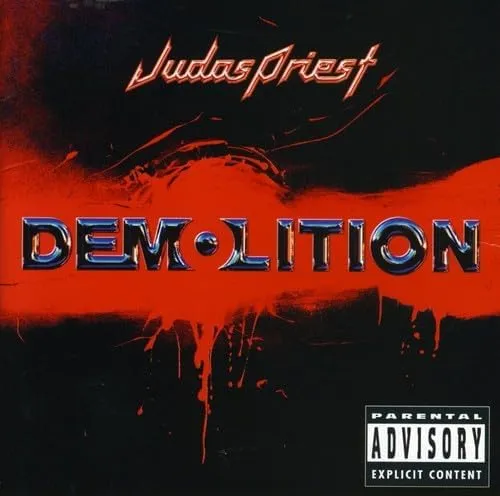Released on July 16, 2001, Demolition is the fourteenth studio album by Judas Priest—and while it often flies under the radar, it’s a bold and defiant record that showcases the band’s willingness to evolve, even when walking unfamiliar ground.
Where 1997’s Jugulator leaned hard into extreme aggression and downtuned brutality, Demolition takes a more nuanced approach. It retains the heavy edge but expands the sonic palette, fusing groove metal, industrial flourishes, and modern production into the classic Priest formula. It’s not a return to form—it’s a reinvention.
And while fans were still adjusting to life without Rob Halford, Tim “Ripper” Owens stepped into the role with conviction and fire. Demolition doesn’t try to replicate the past—it forges something darker, grittier, and unapologetically 21st century.
Demolition: Reinvention with Fire
The album opens with “Machine Man,” and right away it’s clear this isn’t your father’s Judas Priest. The opening riff is mechanical and relentless—a rhythmic stomp that sounds like steel on concrete. Owens tears into the verses with feral intensity, delivering lines like he’s spitting shrapnel. The chorus explodes with double-kick fury and snarling attitude. It’s Priest going cybernetic—and somehow, it works.
“One on One” follows with a groove-heavy sledgehammer riff and an anthemic hook that borders on nu-metal without falling into parody. It’s built for arenas—loud, stomping, and undeniably catchy. The band rides the line between traditional heavy metal and early 2000s aggression with surprising ease.
By the time “Hell Is Home” creeps in, things take a darker turn. It’s moody, slow-burning, and layered with menace. Owens dials back the screams in favor of a brooding, restrained vocal—showing range and emotional control. The lyrics are introspective and tortured, giving the track a sense of depth and weight that few expected.
Steel Reforged for a New Era
Tracks like “Feed on Me” and “Devil Digger” highlight the album’s fearless experimentation. “Feed on Me” is a slithering, almost industrial piece, with eerie harmonics and whispered vocals building to a heavy chorus. It’s a far cry from “Electric Eye,” but it proves the band isn’t content to coast on nostalgia.
“Devil Digger,” on the other hand, is a sinister mid-tempo crusher with a classic Priest groove hidden beneath its modern sheen. The chorus hits hard, and Glenn Tipton’s guitar leads cut through the grime like sparks off a grinding wheel. It’s heavy, sure—but it’s also hooky, tight, and memorable.
“Bloodsuckers” is one of Demolition’s most venomous tracks—a snarling assault aimed at betrayal and exploitation. Fueled by a relentless, chugging riff and pounding drums, the song surges forward with raw aggression. Tim “Ripper” Owens delivers one of his most furious vocal performances on the album, spitting out each line with bile and bitterness. Lyrically, it’s a scathing takedown—part personal vendetta, part broader indictment—and the music reflects that intensity. The chorus is jagged and confrontational, while the solo section erupts like a scream of rage through clenched teeth. It’s Priest at their most vicious, and it hits hard.
“Close to You” takes the biggest left turn—a dark, almost ballad-like track with an emotional vulnerability rarely heard from Priest. It’s slow, atmospheric, and haunting, showing that even in their heavier incarnation, they could still write something subtle and moving.
Ripper’s Moment and the Band’s Brave New Sound
Say what you want about the Halford-less era, but Tim “Ripper” Owens gives this album everything he has. His performance on Demolition is fearless, versatile, and full of attitude. Whether he’s screaming, snarling, or pulling back into lower registers, Owens owns every second. He doesn’t mimic Halford—he makes the songs his own.
Guitarists Glenn Tipton and K.K. Downing, too, aren’t just recycling old tricks. Their riffs are heavier, more modern, and sometimes deliberately unconventional. The solos are still sharp and melodic but often infused with a darker tone. It’s clear they weren’t trying to recreate Painkiller—they were trying to write something new.
Scott Travis continues to be the band’s secret weapon—his drumming is relentless, modern, and explosive throughout. Whether he's laying down punishing double-bass runs or complex grooves, he anchors the chaos with military precision.
Production and Performance: Modern Metal, Priest Style
Produced by Glenn Tipton and engineered with a slick, modern edge, Demolition sounds nothing like Priest’s earlier records—and that’s the point. The production leans into low-end heaviness, processed tones, and thick guitar layers. Some traditionalists found it jarring, but for what the album aims to be, it’s a perfect fit.
The mix gives Owens plenty of space to shine, and the rhythm section feels appropriately massive. Tipton and Downing’s riffs are crunchy and muscular, while the solos still slice through with clarity. It’s Judas Priest dressed in darker colors—but still unmistakably Priest beneath the armor.
Final Verdict: 8/10
Demolition isn’t for the faint of heart—or those stuck in the past. It’s a bold, often misunderstood record that captures a legendary band pushing against their own boundaries. While it may never have the iconic status of British Steel or Screaming for Vengeance, it deserves recognition for its ambition, its ferocity, and its refusal to play it safe.
For open-minded fans, it’s a thrilling detour into a heavier, grittier world. For those new to the Ripper Owens era, it’s a surprisingly rich and rewarding listen. This isn’t Judas Priest fading away—it’s Judas Priest fighting to evolve and doing it on their own terms.
Standout-Tracks
Machine Man—cyber-metal mayhem
Hell Is Home—slow, brooding, and menacing
One on One—riff-heavy and built for the stage
Feed on Me—creepy, industrial, and infectious
Bloodsuckers—raw, venomous, and intense
Close to You—haunting, emotional, and unexpected
Devil Digger—classic riff power in a modern shell

